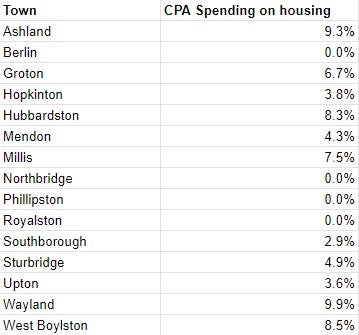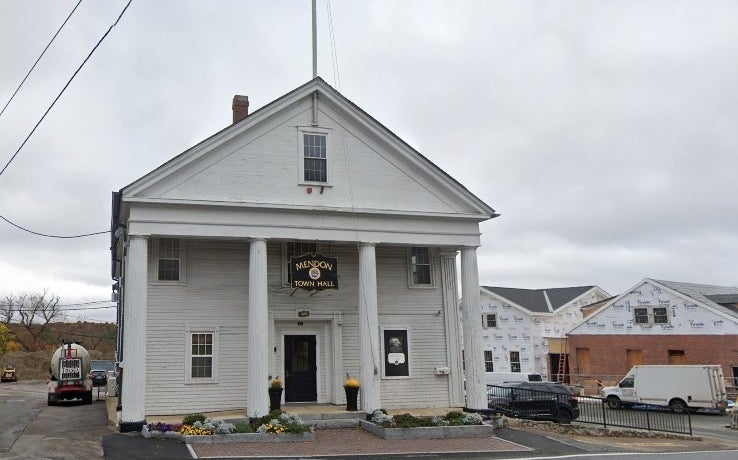While Beacon Hill searches for solutions to the serious housing shortage that fuels affordability concerns in Massachusetts, a real estate industry organization wants to see the Community Preservation Act program retrofitted to put a greater emphasis on housing production.
A new report conducted by the Center for State Policy Analysis at Tufts University in conjunction with the Greater Boston Real Estate Board found that more than a third of CPA communities are not meeting an existing requirement around spending on housing initiatives, including 15 in Central Massachusetts. It suggested ways the CPA program could be refocused to address the housing crisis. The report’s findings are featured on a website that launched Wednesday, www.mahousingsolutions.com.
According to the report, towns participating in the CPA program are required to spend 10 percent of their CPA dollars on affordable housing. Central Massachusetts communities that fall short of this mark are Ashland, Berlin, Groton, Hopkinton, Hubbardston, Mendon, Millis, Northbridge, Phillipston, Royalston, Southborough, Sturbridge, Upton, Wayland, and West Boylston.

“Are we missing an opportunity here with the CPA? It was created in a time and place 20 years ago where things were much, much different. The focus was urban sprawl. Now we’re really looking at housing and that should be our focus. Are we missing something here by not being able to have it create more for us?” Greg Vasil, CEO of the Greater Boston Real Estate Board, said. He added, “What we were hoping is … can this start a conversation so we go back and look at it and say, ‘Hey, we’ve already got something that works, that communities have bought into, can we find a way to re-tailor this and maybe offer them some more incentives to do more housing and build off of this instead of trying to create another entirely new thing or pass some tax.'”
In 195 of Massachusetts’ 351 municipalities, voters have approved an increase in their local property taxes with the promise of state matching funds to pay for affordable housing, historic preservation, open space investments, and more. The CPA program was signed into law by Gov. Paul Cellucci in 2000.
“If you were designing it today … I don’t know where you would end up, but I think housing would be higher on the list,” Evan Horowitz, executive director of cSPA and the author of the report, said. “That’s what everyone’s talking about. That’s the one of the biggest challenges the state faces right now. We have a program where it’s one of the pillars, but it could be the main pillar of this program.”
The report said that housing projects have regularly been overshadowed in the CPA program due in part to “a clear and longstanding tension between this commitment to housing and the other facets of the program, like historic preservation and the protection of open space.”
“Efforts to protect open space or expand public parks can impede the development of much-needed housing by reducing the amount of land available for new construction. And in the current moment, when housing affordability is a leading policy concern, with lawmakers actively looking to reduce zoning restrictions and accelerate new construction, the more preservationist goals of CPA have lost some of their urgency,” the report said.
About one in five CPA projects is dedicated to affordable housing, the report found, and fewer than one in 20 CPA projects involves the creation of new homes. Meanwhile, the preservation of historic structures has accounted for more than 40 percent of CPA projects, and together open space and recreation initiatives have also accounted for about 40 percent of CPA projects.
In terms of dollars, spending on CPA housing projects can exceed 40 percent in some years, though the report attributed that to the expensive nature of housing projects and the fact that some of the large, urban communities that participate in the CPA program have used greater portions of their CPA money to address housing issues.
“Over 80 percent of all CPA spending in Cambridge, for instance, has gone to housing — by far the highest level in the state; nearby Boston, Chelsea, and Somerville have all spent more than half their CPA dollars on housing,” the report said. “Meanwhile, the typical municipality devotes only 14 percent of CPA spending to housing; half of towns spend more, while half spend less.”
State law requires each community that has adopted the CPA to “spend, or set aside for later spending,” at least 10 percent of the annual CPA revenues for community housing purposes each fiscal year. But the GBREB/cSPA report said that 70 CPA communities (about 36 percent of the total) have spent or set aside less than that percentage on housing projects since they adopted the CPA.
The GBREB opposes local real estate transfer fees as a way to raise money for affordable housing investments and has argued this session that municipalities should instead focus on utilizing the CPA as a way to fund those projects. Vasil said the GBREB has supported the CPA since its inception because it could provide cities and towns with a predictable stream of revenue, unlike transfer taxes.
“So many communities are clamoring for transfer taxes today. And, you know, you can’t always bank on that money coming in. Whereas this is equitable, it’s fair. Everyone pays for it that’s a property owner in a community, whether you’re large or small … you all contribute something,” he said. “I think if housing truly is a concern and is a desire of the community, everybody should pay something. It shouldn’t be just sort of foisted on one particular class of people.”
The GBREB/cSPA report called the CPA “a vital and flexible program” that could become “a critical tool in the effort to expand housing options for families” if the state makes a series of changes.
Among the changes recommended is that the state do more to ensure that all municipalities meet the minimum requirement to devote 10 percent of CPA revenue to affordable housing, offer additional matching funds for CPA cities and towns that commit either at least 20 percent of their CPA dollars to affordable housing or 10 percent to support new housing units, enforce reporting requirement around housing trusts, and create a dedicated team within the executive branch to help small towns handle technical challenges around housing projects.
“Communities across Massachusetts must play their part in meeting affordable housing requirements and helping the state overcome the housing crisis,” Kate Franco, board chair of the Greater Boston Real Estate Board, said. “By enforcing — and even strengthening — the CPA, the state has an opportunity to send a clear message that it is committed to making the Commonwealth of Massachusetts more affordable.”

